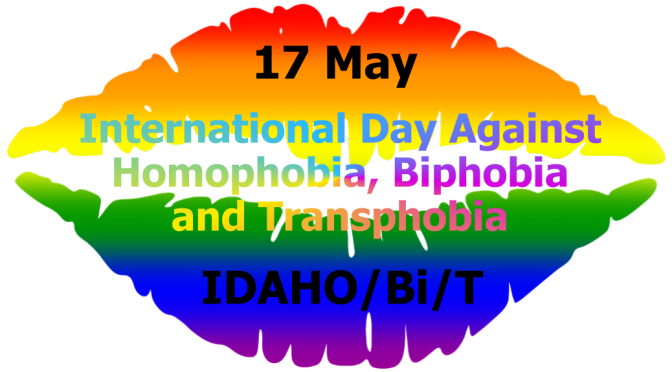International Day Against Homophobia
The annual, since 2005, IDAHO Day celebrates the 1990 removal of homosexuality from the WHO’s International Classification of Diseases (ICD). That it took 17 years from the American Psychiatric Association’s (APA) initial tentative removal of homosexuality from the Diagnostic and Statistical Manual of Mental Disorders (DSM) demonstrates how long change in these areas can take.
Whilst IDAHO initially concentrated on homophobia and lesbophobia – though rarely naming the latter, gay rights have moved on. Over time they have become Lesbian and Gay, LGB, more recently LGBT, with even Stonewall England & Wales now Trans inclusive. The debate over that may be over, but the inclusion of I for Intersex, Q for Queer, and a panoply of other letters including Pansexual, Asexual, Non-Binary and more, still rages.
Biphobia and Transphobia (IDAHOBiT)
The addition of ‘T’ for Transphobia, turning the acronym from a US state into the less likely to be confused IDAHOT, happened in 2009 but for many has still not taken root. Bisexual erasure is sadly commonplace and the explicit inclusion of Biphobia is more recent still, creating the more fun acronym IDAHOBiT, that sounds like a type of Middle Earth hobbit! Will adding yet more letters create an even more mythical sounding alphabetical chimera?
What about including Intersex?
Do intersex people even suffer interphobia? Yes of course they do. It can, however, appear as any of the other phobias as cases of mistaken or misunderstood identity. Nor is it really an identity, it is not a sexuality or gender, but a sex that may not be fully male or female or varying degrees of combination of the two.
Interphobia may exist in cases of law, sport, services or facilities, which may be defined only in male/female terms, excluding and discriminating against those whose nature may not wholly fit into one of those narrowly defined sex categories. Thus, interphobia is a form of sexism – which itself is often binary-sex defined. The worst case of interphobia is still that exhibited by medical clinicians and some parents who often try to shoehorn intersex children into one bodily sex category or another via non-consensual surgeries (on the part of the child).
Some LGBTI and LGBTIQ/LGBTQI groups have taken to including intersex as the ‘I’ of HOBIT, erasing the original purpose as the ‘i’ of Bi. It is, furthermore, doubtful whether intersex advocacy organisations were even asked whether they wanted to be part of HOBIT, or indeed HOBiTI. “Nothing About Us Without Us” was the appropriate battle-cry of disability activists, which might be co-opted here – with respect. That said, few would turn down the opportunity for increased understanding and awareness, so long as the education is accurate and publicity helpful, which it is not always. Misplaced good intentions and misappropriations can do more harm than good.
OII UK, the UK arm of the leading international intersex organisation, has praised the United Nations Human Rights commissioner for drawing attention this IDAHO Day to the plight of not only LGBT youth but also intersex youth stating that:
“intersex children and young people may be subjected to medically unnecessary, irreversible surgery and treatment without their free and informed consent. These interventions can result in severe, long-term physical and psychological suffering, affecting children’s rights to physical integrity, to health, privacy and autonomy and may constitute torture or ill-treatment. States should prohibit such interventions.” – Office of the UN High Commissioner for Human Rights
What about the Others?
Pansexuals can be accused of not being real or be erased, somewhat ironically, by bisexuals – usually the chief victms of erasure. Non-binary and agender folk can experience something similar. Asexuals can often be misconstrued and misunderstood. A Facebook post by the 1.5-million-followers popular Lizzy the Lezzy page ran a comical post on asexual attitudes to sex which had some 2000 shares and hundreds of illuminating comments, many spot on, but some exhibiting the abusive assumptions that “sexuals” may have, that “having sex” should be an entitlement within a relationship.
lol! asexuals, is this true?
Posted by Lizzy the Lezzy on Saturday, 16 May 2015
Inclusion and Acronymitis
Diversity and equality should mean full and equal inclusion for all, It can, though, become unwieldy over time, as the tail becomes longer than the original dog, and those at the head of “gay rights” begin to resent being wagged by the ever-lengthening tail, which few may understand except those in MOGAI, AVEN, Alt and Fetlife communities. In the same way, in the UK, Race Equality, Sex Discrimination and Disability provisions were eventually combined with anti-homophobia initiatives to create the 2010 Equality Act. At some point IDAHO Day will need to become the International Day Against Hate and Discrimination Based Upon Sex, Orientation, or Identity. Quite a mouthful but shorter than IDAHOBiTIQA…XYZ. In short, human rights and respect – something in the 21st century we should all be moving towards, if not arrived at. “LGBT rights are human rights” as the recent Council of Europe report reminds us. Until that day, IDAHO/Bi/T reminds us that we are not there yet, but still undeniably a work in progress.
